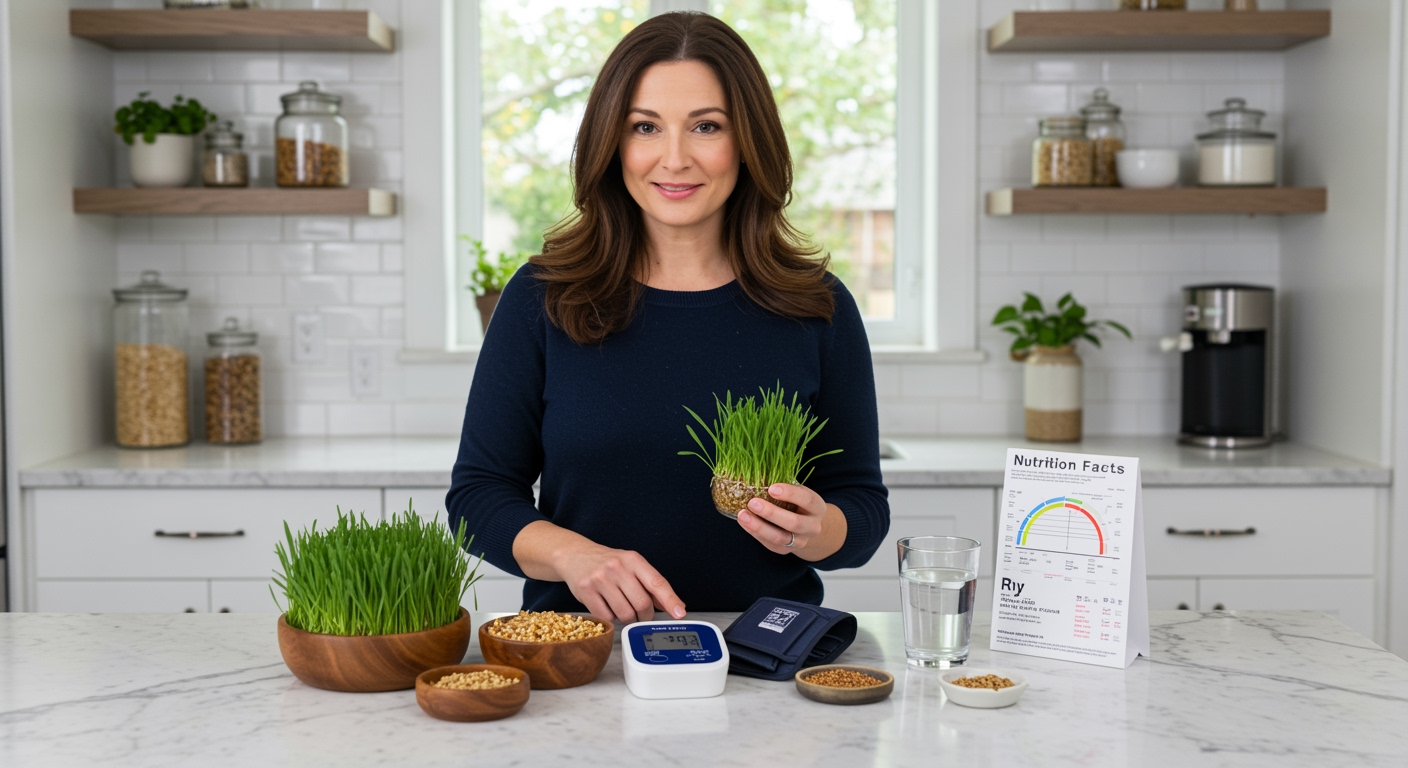✪ Key Takeaway: Rye sprouts may help support healthy blood pressure through their magnesium, potassium, and fiber content, but they work best as part of a complete diet.
Introduction
Your doctor mentions low blood pressure and suddenly you start wondering about every food choice you make.
You might be asking this question because you heard that sprouted grains have special health benefits, or maybe someone suggested that rye sprouts could help with your blood pressure concerns.
Hi, I am Abdur, your nutrition coach and today I am going to explain how rye sprouts might affect your blood pressure and whether they deserve a place in your daily eating plan.
What Makes Rye Sprouts Different From Regular Rye?
Sprouting transforms rye grains in ways that could benefit your cardiovascular system.
When rye seeds sprout, their nutrient density increases significantly compared to the original grain.
The sprouting process breaks down complex compounds and makes minerals more bioavailable to your body.
Research shows that sprouted grains contain higher levels of magnesium and potassium, two minerals that play crucial roles in blood pressure regulation.
Your body uses magnesium to relax blood vessel walls, while potassium helps balance sodium levels and supports proper fluid balance.
The sprouting process also reduces antinutrients like phytic acid, which can interfere with mineral absorption in your digestive system.
✪ Fact: Sprouting can increase magnesium content by up to 30% compared to unsprouted grains.
How Do The Nutrients In Rye Sprouts Support Blood Pressure?
The mineral profile of rye sprouts creates a foundation for healthy blood pressure support.
Magnesium acts as a natural calcium channel blocker, helping your blood vessels relax and reducing resistance to blood flow.
When your blood vessels can relax properly, your heart does not have to work as hard to pump blood throughout your body.
Potassium works through a different mechanism by helping your kidneys excrete excess sodium through urine.
This sodium-potassium balance is critical because too much sodium causes your body to retain water, increasing blood volume and pressure.
Rye sprouts also contain soluble fiber, which can help reduce cholesterol levels and improve overall cardiovascular health.
The antioxidants in sprouted rye, including vitamin E and phenolic compounds, help protect your blood vessels from oxidative damage that can contribute to high blood pressure over time.
✪ Pro Tip: Combine rye sprouts with other potassium-rich foods like bananas or spinach for maximum blood pressure support.
Can Rye Sprouts Actually Raise Low Blood Pressure?
This question requires a nuanced answer because blood pressure regulation is complex.
Rye sprouts do not directly raise blood pressure like caffeine or sodium might.
Instead, they provide nutrients that support your cardiovascular system in maintaining healthy blood pressure levels.
If you have chronically low blood pressure, the minerals in rye sprouts can help your body achieve better fluid balance and vascular function.
The B vitamins in sprouted rye, particularly folate and B6, support healthy red blood cell formation and circulation.
Better circulation means your heart can pump blood more efficiently, which may help stabilize blood pressure readings.
However, rye sprouts work best as part of a comprehensive approach that includes adequate hydration, regular movement, and balanced nutrition.
✪ Note: Always consult your healthcare provider before using foods to address blood pressure concerns.
What Is The Best Way To Include Rye Sprouts In Your Diet?
Adding rye sprouts to your daily routine requires some planning but offers multiple delicious options.
You can sprinkle fresh rye sprouts on salads, soups, or sandwiches for a crunchy texture and mild nutty flavor.
Many people blend rye sprouts into smoothies along with fruits and vegetables for a nutrient-dense breakfast or snack.
Start with small amounts, about one tablespoon daily, and gradually increase to two or three tablespoons as your digestive system adjusts.
You can also incorporate rye sprouts into homemade bread, muffins, or energy bars for a sustained nutrient boost.
Store fresh rye sprouts in your refrigerator for up to one week, or you can dehydrate them for longer storage.
Remember that consistency matters more than quantity when it comes to supporting your cardiovascular health through whole food nutrition.
✪ Pro Tip: Rinse rye sprouts thoroughly before eating to remove any bacteria and ensure food safety.
Are There Any Risks Or Side Effects To Consider?
While rye sprouts are generally safe for most people, some considerations deserve your attention.
People with celiac disease or gluten sensitivity should avoid rye sprouts because rye contains gluten proteins.
Some individuals may experience digestive discomfort when first introducing sprouted grains due to their higher fiber content.
If you take blood pressure medications, the potassium content in rye sprouts could potentially interact with certain drugs.
Raw sprouts carry a small risk of bacterial contamination, so proper handling and storage are essential for food safety.
Pregnant women and people with compromised immune systems should consider cooking rye sprouts before consumption.
As with any dietary change, start slowly and pay attention to how your body responds to new foods.
✪ Note: Always discuss significant dietary changes with your healthcare provider, especially if you have existing health conditions.
The Bottom Line
Rye sprouts can be a valuable addition to your diet if you are looking to support healthy blood pressure through natural means.
Real nutrition happens when you consistently choose whole foods that work together to support your health goals.
I would love to hear about your experience with rye sprouts or any questions you might have about incorporating sprouted grains into your daily routine, so please share your thoughts in the comments below.
References
At NutritionCrown, we use quality and credible sources to ensure our content is accurate and trustworthy. Below are the sources referenced in creating this article:
- Harvard Health Publishing: Sprouted grains: Are they more nutritious than regular whole grains?
- Lybrate: Rye Benefits And Side Effects
- One Degree Organics: Sprouted Grains: The Benefits of Sprouting & Everything You Need to Know
- Ancient Grains: Rye Nutritional Benefits





